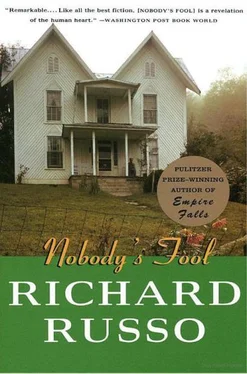Free will. An issue much discussed in his philosophy class, and one of the first things to disappear. His professor, a very young man it seemed to Sully, had surprised him by taking the position that there was no such thing as choice, that free will was merely an illusion. Sully had been one of the few older students in the large class and had never said much, but he wished he had the professor here now so he could explain why this wasn’t really a choice. He’d probably go about it by disproving the truck. To Sully it looked for all the world like a choice. His. Fuck it, he decided.
Climbing into the cab, Sully turned the ignition, ground the truck into gear, released the brake, paused and stepped on the accelerator. He might have stopped when he heard and felt the tires spinning in the mud, but he didn’t, even though he knew what that meant. Instead, he gunned the engine, put the accelerator to the floor, months of submerged fury suddenly at the surface, the high-pitched unrelenting scream of the truck’s engine almost his own, the truck’s rear wheels shooting mud all the way up the side of Carl Roebuck’s half-built house. Then, without moving either forward or back, the truck began to shake so violently that Sully was barely able to keep his hands on the wheel until the engine finally hiccuped twice, shuddered and died. Just as well, too. The rear wheels’ lug nuts were already below ground. Stupid, he thought. Just an hour ago he’d been wondering if a second stupid streak in the same year was a possibility, and now here he was right in the middle of one before he’d even had a chance to contemplate the odds. Sully got out and surveyed the situation. The wind had picked up, and whistling through the pines nearby it sounded like laughter.
Mrs. Gruber, who had been disappointed by the snail, phoned midmorning, wondering if Miss Beryl’s mail had been delivered and if she’d looked over the circular that announced the grand opening of the new supermarket out by the interstate exit. Miss Beryl, as Mrs. Gruber feared, had tossed the circular into the trash without so much as a glance.
“They have some wonderful bargains,” said Mrs. Gruber, who hated to miss a grand opening of anything. She had pored over the circular with mounting excitement and regret, the latter caused by the fact that she did not drive and that the supermarket was five miles away. The circular had been six full pages, and each page was in full color, picturing deep red cuts of beef, Kelly green vegetables. Even the most mundane items, like toilet paper and laundry detergent, looked exotic and thrilling. And all at incredible savings. Mrs. Gruber wanted to go to the supermarket and find out for herself if the circular truly represented the wonders of the new store. She knew it was against the law for advertisers to say things that weren’t true, so she was hopeful. Wasn’t it just like Miss Beryl to toss the circular, she thought, genuinely irked by her friend’s perverse refusal to be excited by anything exciting. “Go find it,” she urged Miss Beryl. “Take a look at it.”
“It’s in the trash,” Miss Beryl told her. “Under my wet tea bag.”
“You won’t believe the bargains,” Mrs. Gruber said, quoting almost directly from the circular itself.
Miss Beryl glanced out the front room window, hoping the snow might be pretext for refusal. She did need to go to the store today, though the North Bath IGA would do her fine. It was close, and she didn’t mind that there weren’t any bargains. It was Miss Beryl’s view that anything involving crowds of jostling bargain seekers wouldn’t be a bargain. But most of the snow had melted, and the street was actually dry in a few spots.
“It’ll be good to get out,” Mrs. Gruber said. “Let’s go. Let’s sally forth,” she said, purposely using one of her friend’s favorite phrases.
“I’ll pick you up in half an hour,” Miss Beryl told her.
“I’ll be outside,” Mrs. Gruber said. To her mind, being on the porch and saving her friend the necessity of pulling into the driveway was a way of paying Miss Beryl back for agreeing to go to the new supermarket.
“Stay inside,” Miss Beryl said. “I’ll toot.”
“I don’t mind,” Mrs. Gruber insisted. “I’ll be on the porch.”
“Half an hour,” Miss Beryl said.
“Goody,” Mrs. Gruber said, hanging up.
Miss Beryl had half a page remaining in the chapter of her Trollope, so she finished it, then stood up. From the side windows of her front room she could see up and down Main Street, and when she set her book down and looked up Main in the direction of Mrs. Gruber’s house she could see that Mrs. Gruber was already standing on her porch and peering down the street at Miss Beryl’s house, fully expecting, no doubt, Miss Beryl’s car to be backing out of the drive. All of two minutes had elapsed since they’d hung up.
Miss Beryl rose and sighed. She was just about to fetch her overcoat when a big, noisy car she’d never seen before pulled up at the curb outside her front window and a young woman who looked to be in her early twenties got out and checked something written on a slip of paper. She was wearing a sweater and no overcoat, and Miss Beryl could not help but notice, even at that distance, that the young woman had an absolutely huge bosom.
“Who the heck are you?” the old woman said out loud. “Look at those bazooms,” she added to Clive Sr., on the TV, who smiled back at her appreciatively, though he was facing the wrong direction to see. “You too, Ed. Take a gander at those,” she instructed Driver Ed.
Before closing the car door, the young woman leaned back inside. At first, she appeared to be looking for something on the seat, but then Miss Beryl saw a small head move inside the vehicle on the passenger side of the front seat.
When the young woman started across the snowy terrace and up the walk toward the porch, the car door opened and a very small child clambered out. Apparently, the young woman (the child’s mother?) heard the door open, because she spun and almost flew back to the curb, shoving the child back inside roughly, punching the door lock down and slamming the door shut. Even from inside, Miss Beryl could hear the young woman shouting. “Sit, goddamn it!” she was instructing the child. “I’m coming right back. You hear me? Just sit in the goddamn car and look at your goddamn magazine. You hear me? If you get out of this car again, I’m going to knock your block off, you hear?”
“Someone ought to knock your block off,” Miss Beryl said as the young woman turned on her heel and started back across the terrace. She wasn’t quite to the porch when the door opened again, and the child climbed back out. This time the young woman stayed where she was, looked up into the web of black elm branches as if some answer, in the form of a chattering squirrel perhaps, might be offering advice. “You could close the goddamn door, at least,” she yelled at the child, who had begun to follow and now stopped. Miss Beryl couldn’t tell if the child was a boy or a girl, but whichever it was turned, put a small shoulder to the heavy door and pushed. When the door swung shut, the child lost its footing and slipped to its knees. Again the young woman looked to the sky for answers. “Come on, then, if you’re coming,” she shouted, and the child, wet kneed now but surprisingly dry eyed, did as it was told. There was something frighteningly robotlike about the child’s movements, and Miss Beryl was reminded of a movie she’d started to watch on television years ago about zombie children, a movie she’d quickly turned off.
“What’s wrong with that child?” she asked Clive Sr. as she moved from the front to the side window so she could watch the young woman and the child climb the porch steps. It was a little girl, Miss Beryl decided, and all she was wearing from the waist up was a thin T-shirt.
Читать дальше












